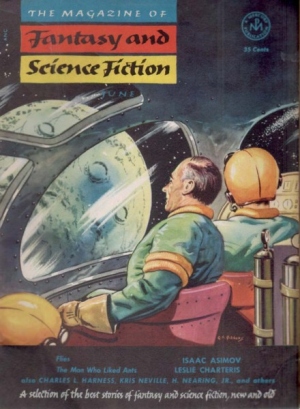Birthday Reviews: Charles L. Harness’s “Child by Chronos”

Charles L. Harness was born on December 29, 1915 and died on September 20, 2005.
Harness’s novelettes “An Ornament to His Profession” and “The Alchemist” were both nominated for the Nebula and Hugo Awards. His novella “Probably Cause” was nominated for a Nebula and the novella “Summer Solstice” was nominated for a Hugo. He was also nominated for a retro-Hugo for the novella “The Rose.” Harness’s novel The Ring of Ritornel was nominated for the Ditmar Award in 1969.
“Child by Chronos” was first published by Anthony Boucher and J. Francis McComas in the June 1953 issue of The Magazine of Fantasy and Science Fiction. The following year, they included it in the anthology The Best of Fantasy and Science Fiction, Third Series. It was translated into French for the magazine Fiction #26 in 1956, in 1966 for the anthology Historiques fantastiques de demain, and again for Planète #33 in March 1967, the last translation being done by Alain Dorémieux. Jacques Sadoul would also include it in his Anthologie de la littérature de Science-Fiction in 1981. It was published in German in 1969 in 9 Science Fiction-Stories, translated by Brigit Ress-Bohusch and in Italian in 1977 in Il future alla sbarra, translated by Roberta Rambelli. Charles Waugh and Martin H. Greenberg included it in 1980’s anthology Love 3000 and it was reprinted in 1998 in the NESFA Press Charles L. Harness collection An Ornament to His Profession.
In the film Somewhere in Time, based on Richard Matheson’s novel Bid Time Return, Elise McKenna (Susan French) gives Richard Collier (Christopher Reeve) a pocket watch in 1972 which he carries back with him to 1912 and gives to a much younger Elise (Jane Seymour). At no time in its existence is the watch out of Elise’s or Richard’s possession, so there is no way for the watch to have been made or purchased, it just is. Charles Harness published “Child by Chronos” 18 years before Matheson’s novel and 23 years before the film, but has a similar paradox at the heart of his story.
Harness’s story focuses on a woman who hates her mother, whom she is amazingly like, and who notes that all the men she has ever loved were also involved with her mother, an unhealthy psychological situation. Her life isn’t made easier by the strange educational regimen her mother instituted. Rather than allow her to attend school, she was made to memorize all the headlines published from the time of her birth. Her mother, who made her living as a highly successful prognosticator, never gives her an explanation for this strange education.